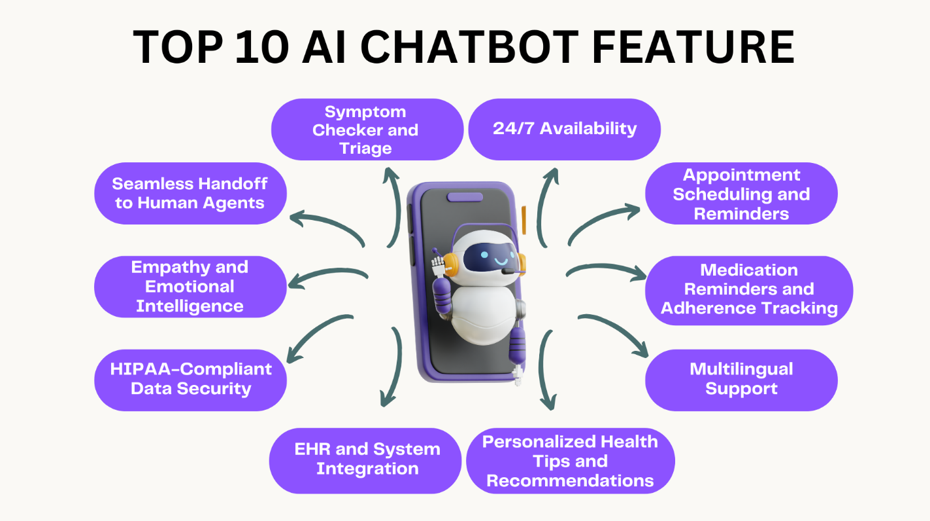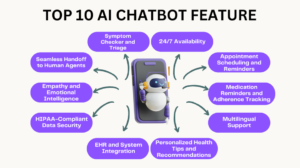Table of Content
- What is an AI chatbot?
- Top 10 Ai chatbot feature
- Pros and cons of AI chatbot
- Use Cases of AI Chatbots in Healthcare
- Conclusion
What is an Ai chatbot?
An AI chatbot is basically a computer program that can chat with you like a real person! It uses artificial intelligence to understand what you’re saying and respond in a way that makes sense. So AI Chatbot Features, when you ask it questions or talk about stuff, it tries to give you helpful or fun answers based on what it knows. It’s like having a virtual friend who can chat about all sorts of topics:
Top 10 Ai chatbot Feature
-
Symptom Checker and Triage
- Feature: Assesses patient symptoms and provides recommendations (self-care or medical consultation).
- Benefit: Helps prioritize care and reduces unnecessary hospital visits AI Chatbot Features.
- Example: Directs patients to ER for severe symptoms or offers home remedies for mild conditions.
-
24/7 Availability
- Feature: Provides uninterrupted assistance to patients.
- Benefit: Ensures instant access to medical information and support, especially in emergencies.
- Example: Patients can ask health-related questions at any time without waiting for office hours.
-
Appointment Scheduling and Reminders
- Feature: Automates booking, rescheduling, and sends reminders for appointments.
- Benefit: Reduces no-shows and helps patients stay on top of their healthcare needs.
- Example: Sends a reminder for a follow-up visit or a vaccination appointment.
-
Medication Reminders and Adherence Tracking
- Feature: Reminds patients to take their medication on time and monitors adherence.
- Benefit: Supports chronic disease management and prevents missed doses.
- Example: A diabetic patient receives notifications for insulin doses.
-
Multilingual Support
- Feature: Communicates in multiple languages with natural language processing (NLP).
- Benefit: Increases accessibility for diverse populations.
- Example: A chatbot can interact in English, Spanish, or Mandarin based on the patient’s preference.
-
Personalized Health Tips and Recommendations
- Feature: Delivers tailored health advice based on patient data and behavior.
- Benefit: Promotes preventive care and encourages healthy habits.
- Example: Provides diet tips for heart patients or exercise plans for weight management.
-
EHR and System Integration
- Feature: Syncs with Electronic Health Records (EHRs) and other hospital systems.
- Benefit: Offers relevant insights and ensures smooth data exchange.
- Example: Accesses patient history to provide personalized responses or suggest relevant specialists .
-
HIPAA-Compliant Data Security
- Feature: Protects patient data with encryption and complies with healthcare regulations.
- Benefit: Builds trust by safeguarding sensitive health information.
- Example: Ensures the chatbot meets HIPAA or GDPR privacy standards.
-
Empathy and Emotional Intelligence
- Feature: Identifies emotional cues and responds with empathy.
- Benefit: Enhances patient experience by simulating human-like understanding.
- Example: Provides comforting responses to anxious patients seeking support.
-
Seamless Handoff to Human Agents
- Feature: Transfers complex cases to healthcare professionals.
- Benefit: Ensures patients get expert help when needed, minimizing chatbot limitations.
- Example: Escalates a conversation to a nurse or doctor for urgent issues.
Pros and Cons of AI Chatbots in Healthcare
AI chatbots are transforming healthcare by providing fast, efficient, and accessible support for both patients and providers. However, they also come with certain limitations. Below is a detailed breakdown of the advantages and disadvantages of using AI-powered chatbots in healthcare.
Pros of AI Chatbots in Healthcare
-
24/7 Availability and Instant Response
- Benefit: Chatbots provide round-the-clock support, ensuring patients get the help they need without waiting for office hours.
- Impact: Reduces response time, especially for non-critical inquiries.
-
Improved Accessibility and Patient Engagement
- Benefit: Multilingual chatbots with easy-to-use interfaces make healthcare services accessible to diverse populations.
- Impact: Engages patients more actively, leading to better health outcomes and satisfaction.
-
Symptom Checking and Triage
- Benefit: Chatbots assess symptoms and direct patients to the appropriate care level (e.g., self-care, telemedicine, or ER).
- Impact: Reduces unnecessary hospital visits and eases the burden on healthcare facilities.
-
Efficient Appointment Scheduling and Reminders
- Benefit: Automates appointment booking, rescheduling, and sends reminders.
- Impact: Lowers no-show rates and ensures timely follow-ups.
-
Medication Adherence Support
- Benefit: Chatbots send reminders for medications, improving patient compliance.
- Impact: Especially beneficial for chronic disease management AI Chatbot Features.
-
Data-Driven Insights
- Benefit: Collects and analyzes patient interactions, offering insights into health trends and patient behavior.
- Impact: Helps healthcare providers make informed decisions and optimize care delivery.
-
Cost-Effective Operations
- Benefit: Reduces operational costs by automating routine tasks and handling large volumes of queries.
- Impact: Frees up healthcare professionals to focus on more complex cases.
-
Personalized Care
- Benefit: Provides customized advice based on patient data, medical history, and behavior patterns.
- Impact: Enhances patient satisfaction by offering tailored care solutions.
Cons of AI Chatbots in Healthcare
1.Lack of Human Empathy
- Issue: While chatbots simulate empathy, they lack the emotional intelligence of human caregivers.
- Impact: May lead to patient frustration, especially in sensitive situations AI Chatbot Features.
2.Data Privacy and Security Risks
- Issue: Handling sensitive patient data involves risks of data breaches and privacy violations.
- Impact: Requires strict compliance with regulations like HIPAA to avoid legal issues and loss of patient trust.
3.Limited Scope and Capabilities
- Issue: Chatbots may struggle with complex medical queries or cases that require nuanced judgment.
- Impact: Risk of misdiagnosis or inappropriate recommendations if patients rely solely on chatbots.
4.Dependence on Internet Connectivity
- Issue: Chatbots require stable internet connections to function effectively.
- Impact: Patients in rural or low-infrastructure areas may face accessibility challenges.
Use Cases of AI Chatbots in Healthcare
-
Patient Triage:
Chatbots can assess symptoms and prioritize patient needs by guiding users through a series of questions to determine the urgency of their condition. This helps direct them to the appropriate care.
-
Appointment Scheduling:
AI chatbots can streamline the appointment booking process, allowing patients to schedule, reschedule, or cancel appointments easily without needing to speak to a human representative.
-
Medication Reminders:
Chatbots can send reminders to patients about taking their medications, ensuring adherence to prescribed treatment plans and improving health outcomes.
-
Health Information Access:
Patients can use chatbots to access information about medical conditions, treatment options, and preventive measures, empowering them to make informed decisions about their health.
-
Follow-Up Care:
After treatment, chatbots can check in with patients to monitor their recovery, answer questions, and provide guidance on post-treatment care.
-
Mental Health Support:
AI chatbots can offer support for individuals dealing with mental health issues by providing resources, coping strategies, and a listening ear, helping to reduce feelings of isolation.
-
Insurance Queries:
Chatbots can assist users with questions related to insurance coverage, claims, and benefits, simplifying the often-complex process of understanding healthcare costs.
Conclusion
AI chatbots offer significant benefits in healthcare, such as improved accessibility, cost reduction, and personalized care. However, they also come with limitations, including privacy concerns, integration challenges, and the lack of human empathy. The key to their successful adoption lies in combining chatbot efficiency with human oversight, ensuring that technology enhances patient care without compromising safety and trust AI Chatbot Features.








